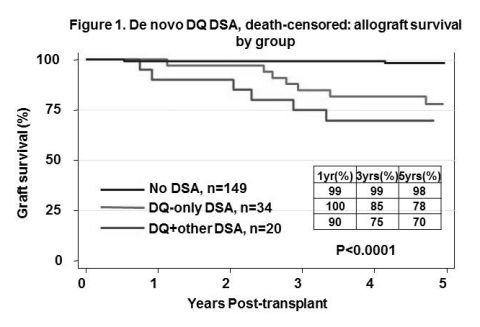Role of Immunoglobulin (Ig)-G Subclasses and C1q in De Novo HLA DQ DSA Kidney Transplant Outcomes, The
Terasaki Foundation Laboratory, Los Angeles, CA
One Lambda Inc, Canoga Park, CA
Department of Pathology, Brody School of Medicine at East Carolina University, Greenville, NC
Meeting: 2013 American Transplant Congress
Abstract number: 528
Background. Anti-HLA DQ antibodies are the predominant HLA class II donor-specific- antibodies (DSAs) after transplantation. Recently, de novo DQ DSA has been associated with worse allograft outcomes. The aim of this study was to determine the further complement-binding characteristics of the most harmful DQ DSA.
Methods. Single antigen beads (SAB) technology was used to screen 284 primary kidney transplant recipients for the presence of post-transplant DQ DSA. Peak DSA sera of 34 recipients with only de novo DQ DSA and of 20 recipients with de novo DQ plus other DSA were further analyzed by a modified SAB assay using IgG subclass-specific reporter antibodies and a C1q-binding assay.
Results. Compared with recipients who did not have DSA, those with de novo persistent DQ-only DSA and with de novo DQ plus other DSA had more acute rejection (AR) episodes (22%, p=0.005 and 36%, p=0.0009), increased risk of allograft loss (HR: 3.7, p=0.03 and HR: 11.4, p=0.001), and lower 5-year allograft survival [Fig1]. De novo DQ-only recipients with AR had more IgG1+IgG3 combination and C1q-binding antibodies (51%, p=0.01 and 63%, p=0.001, respectively) than patients with no AR. Furthermore, the presence of C1q-binding de novo DQ DSA was associated with 30% lower 5-year allograft survival (p=0.003) [Fig2].
Conclusion. The presence of de novo persistent, complement-binding IgG, DQ DSA negatively impacts kidney allograft outcomes. Therefore, early post-transplant detection, monitoring and removal of complement-binding DQ might be crucial for improving long-term kidney transplant outcomes.


Ozawa, M.: Employee, One Lambda, Inc. Nguyen, A.: Employee, One Lambda, Inc. Everly, M.: Employee, One Lambda, Inc. Sasaki, N.: Employee, One Lambda, Inc. Terasaki, P.: Stockholder, One Lambda, Inc.
To cite this abstract in AMA style:
Freitas M, Rebellato L, Ozawa M, Nguyen A, Everly M, Sasaki N, Terasaki P. Role of Immunoglobulin (Ig)-G Subclasses and C1q in De Novo HLA DQ DSA Kidney Transplant Outcomes, The [abstract]. Am J Transplant. 2013; 13 (suppl 5). https://atcmeetingabstracts.com/abstract/role-of-immunoglobulin-ig-g-subclasses-and-c1q-in-de-novo-hla-dq-dsa-kidney-transplant-outcomes-the/. Accessed February 9, 2026.« Back to 2013 American Transplant Congress
